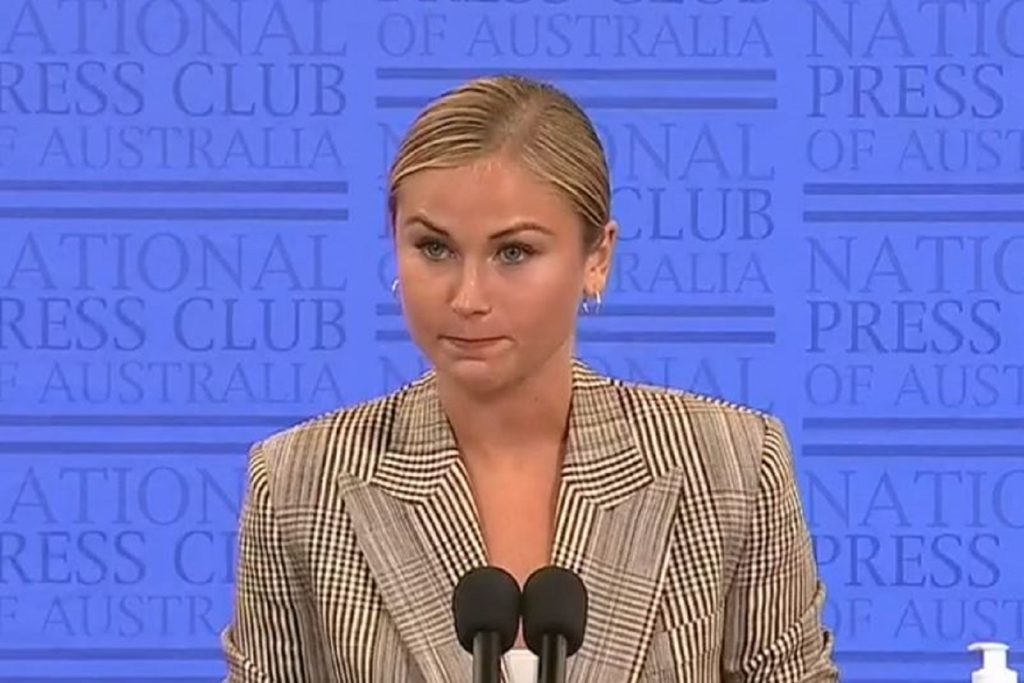Australian of the Year Grace Tame has addressed the National Press Club, sharing her own story of child sexual abuse and calling for a consistent national definition of consent.
She delivered a powerful speech, talking about how Australia can change the national conversation around sexual abuse, in particular child sexual abuse, and support survivors.
Tame said we need to focus on listening to survivors, education in schools, particularly on consent and the process of grooming, and conversation change and reform on a national level. She also said we need to disempower and deter predators, by shifting blame away from survivors and onto abusive behaviour.
“Number one, how we invite, listen, and accept the conversation and lived experience of child sexual abuse survivors,” Tame said.
“Number two, what we do to expand our understanding of this heinous crime, in particular the grooming process, through both formal and informal education.
“Number three, how we provide a consistent national framework that supports survivors and their loved ones, not just in their recovery, but also to disempower and deter predators from action.”
Tame spoke specifically about being abused through grooming as a child, and why the six components of the grooming process – targeting, gaining trust, filling a need, isolating, sexualising and maintaining control – need to be at the forefront of national education.
“We can’t fix a problem we don’t discuss. It begins with conversation…We need to expand the conversation to create more awareness and education,” she said.
To survivors of sexual abuse, Tame offered some advice, saying, “it is our time. We need to take this opportunity…be bold and courageous.”
“I am one of the luckiest ones – who survived, who was believed, who was surrounded by love. And what this shows me is that despite this problem still existing, and despite a personal history of trauma that is still ongoing, it is possible to heal, to thrive, and live a wonderful life,” she said.
“When we share, we heal, reconnect and grow, both as individuals and a united, strengthened collective. History, lived experience, the whole truth – unsanitised and unedited – is our greatest learning resource.
“Ugliness and darkness is unfortunately important because it helps inform how we move into the light.”
To the media, Tame called on journalists to do better when covering stories of sexual abuse.
“Hosts, reporters, journalists, I say to you – listening to survivors is one thing,” she said.
“Repeatedly expecting people to relive their trauma on your terms, without our consent, without prior warning, is another. It’s sensation. It’s commodification of our pain. It’s exploitation. It’s the same abuse.”
When asked directly about Prime Minister Scott Morrison’s comments, after Brittany Higgins’ rape allegation, that his wife said, “to think about this as a father first”. Tame said: “It shouldn’t take having children to have a conscience. And on top of that, having children doesn’t guarantee a conscience.”
While not referring to any specific events, Tame also said she wasn’t surprised by recent allegations of sexual assault and rape in politics.
“It’s not surprising to me at all. Coverup culture, the abuse of power, is not unique to Parliament,” she said.
“It is heightened right now because it’s happening in the centre of our country in Parliament but like I said it’s not unique to Parliament. It happens everywhere.”
If you or someone you know if in immediate danger, call 000. If you need help and advice call 1800Respect on 1800 737 732, Men’s Referral Service on 1300 766 491 or Lifeline on 13 11 14.



